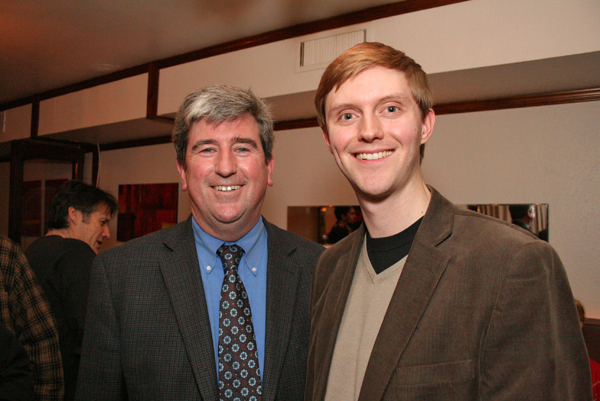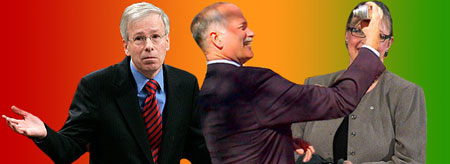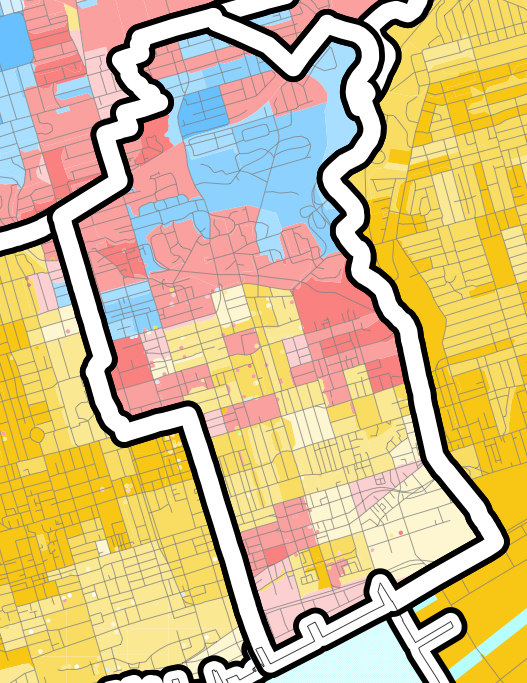
The voters of Toronto Centre have always felt divided. The federal riding includes some of the richest (Rosedale, Yorkville ) and poorest (St. James Town, Regent Park) neighbourhoods in the country. At an all candidates meeting in St. James Town during a recent election one audience member accusingly asked if any candidates lived “south of Bloor,” in other words, if they could identify with and represent him. Likewise, some Rosedale residents have lamented that they can never get the representative they really want because they’re out-voted by their less affluent and more left-leaning neighbours to the south.
As a result, centrist Liberals have comfortably held the riding since 1993. (Before that it was held by the most Progressive of Conservatives, namely David MacDonald, who later joined the NDP, and David Crombie. Before them, more Liberals.) The north half of the riding has always been a Liberal-Conservative contest and the south half a Liberal-NDP one. As the only party with significant support throughout the riding, Liberals take it every time.
Now, that could change. The Federal Electoral Boundaries Commission has proposed new boundaries that would split the riding in two. If adopted after a period of consultation, the south half of the riding will absorb some of Trinity-Spadina to the west and become the new Toronto Centre. The north half of the riding is to acquire the north-east portion of the current St. Pauls to become the new riding of Mount Pleasant. And the Liberals are in serious danger of losing both.
The new Toronto Centre
In fact, I think they might as well kiss the new southern riding of Toronto Centre goodbye. In 2011, that half of the riding favoured the NDP candidate over the Liberal by 3%. Add in the votes from the section of Trinity-Spadina that’s to move over and the NDP margin increases to 5%, or 1,700 votes.
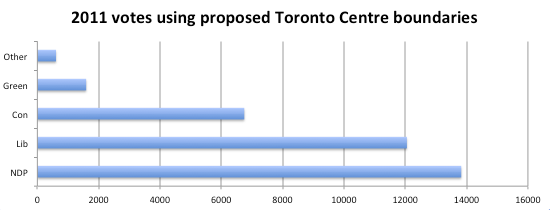
That may not sound like an orange nail in the red coffin, but keep in mind the NDP earned that much support in the current Toronto Centre without any reasonable prospect of winning. With these improved odds will come a more high-profile candidate, more motivated voters and volunteers, and increased money. Liberals, on the other hand, will have moved their money, volunteers and best candidate north to the new riding of Mount Pleasant.
Mount Pleasant
Here Liberal prospects aren’t quite as bleak, but I still think the party has reason for concern. Looking at votes from the north half of Toronto Centre and the new area from St. Pauls, Liberals had a 10% lead over the Conservatives in 2011. So far so good; that’s not as comfortable as the 18% lead they had over the Conservatives in all of Toronto Centre, but not anything to panic about either.
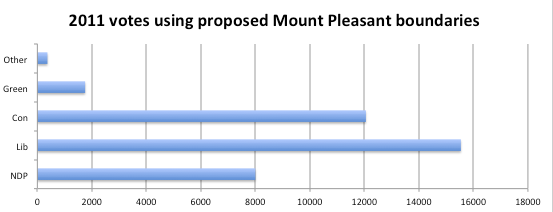
But let’s take a closer look at the nature of that Conservative support. Right-leaning voters in the current Toronto Centre and St. Pauls ridings are extremely demoralized. In the face of Liberal giants Bob Rae and Carolyn Bennett, they’ve known their votes won’t make a difference and many have opted to stay home. Organizationally, the Toronto Centre Conservatives have burned through six different candidates in the past four elections (two of them never even made it to the ballot) and have a very thin volunteer base. Further, their 2011 candidate was not ideally suited to appeal to the north half of the riding, in part because he lived and was almost exclusively active in the south half.
Given all that, the fact that Conservatives would still have only been 10% from victory against such a strong Liberal campaign is impressive. Next time around, like the NDP to the south, Conservative donors, voters and volunteers will be reenergized, and, with the prospect of a victory, the party will be able to recruit a higher-profile candidate capable of taking on a Liberal heavyweight.
Anything could still happen
Some caveats apply, of course. These proposed changes wouldn’t come into force for three years, which is an eternity. And in reality, what happens to party support at the federal level will be the most significant factor in how these ridings get decided. Still, with opportunities for the NDP to pick up another downtown Toronto seat and for the Conservatives to establish a beachhead in central Toronto, these new riding boundaries could really shake up the electoral map.
Data for this post came from Elections Canada’s poll-by-poll results of the 41st General Election held in 2011. Individual polls from current ridings were then assigned to new ones using the maps on Pundits’ Guide. You can download the Excel file I used for my calculations here. The map at the top of this post is from Rabble user Krago. Also note, I was the federal candidate in Toronto Centre for the Green party in the 39th General Election in 2006 and again in a by-election in March 2011 2008.
